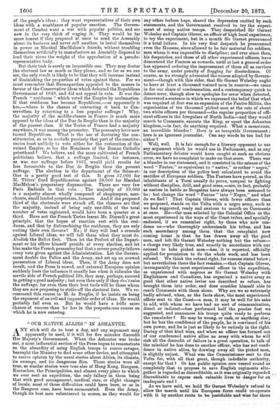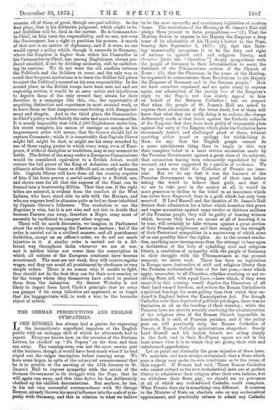" OUR NATIVE ALLIES" IN ASHINTEE.
ANY stick will do to beat a dog, and any argument may apparently be used, if it will for five minutes discredit Her Majesty's Government. When the Ashantee war broke out, a most influential section of the Press began to remonstrate on the absurdity of using English troops to coerce savages, besought the Ministry to find some other device, and attempted to coerce opinion by the usual stories about Africa, its climate, its swamps, and its dangerous flies. These stories were all true, as similar stories were true also of Hong Kong, Rangoon, Kurrachee, the Principalities, and almost every place to which we ever sent an expedition, the only fallacy in them being that with good management, medical care, or slight changes of locale, most of those difficulties could have been, or as in the Rangoon case, have been surmounted. Even the Army, though its best men volunteered in scores, as they would for
any other forlorn hope, shared the depression excited by such statements, and the Government resolved to try the experi- ment of using native troops. They despatched Sir Garnet Wolseley and Captain Glover, an officer of high local experience, to try the experiment, but in a month Sir Garnet pronounced it a total failure. In his very first despatch he pronounced even the Houssas, since allowed to be fair material for soldiers, men whom it was impossible to discipline; and ever since then, his despatches, and those of all other experienced officers, have denounced the Fantees as cowards, until at last a general order has appeared ordering the impressment of them all as carriers to the army, under penalty of flogging for disobedience. Of course, as we strongly advocated the course adopted by Govern- ment—though with this rider, that Sir Garnet Wolseley ought to have at least a thousand trained men in reserve—we come in for our share of condemnation, and a contemporary quick to detect error, though slow to apologise for error when detected, discovered a sentence in which we expressed the belief that what was required at first was an expansion of the Fantee Militia, the organisation of ten thousand picked men at the rate of about two white officers per thousand—the regular proportion of effi- cient officers in the Irregulars of North India—and they would march to Coomassie, execute the King, or upset the Ashantee kingdom,—in fact, do anything required. What a monstrous, an incredible blunder! Here is an incapable Government ; here is an ignorant journalist. Can any words be too bad for either ?
Well, well. It is fair enough for a literary opponent to use any argument which he would use in Parliament, and as any Parliamentary debater would have caught at such an obvious error, we have no complaint to make on that score. There was a blunder in our statement, and it consisted in the misuse of the word " Fantee," as equivalent to "native," or rather " negro," in our description of the policy best calculated to avoid the sacrifice of European soldiers. The Fantees have proved, as the inhabitants of a Terai usually do prove, unequal to fighting without discipline, drill, and good arms,—are, in fact, probably as useless in battle as Bengalees have always been assumed to be ; but change the word " Fantee " into "Negro," and what do we find ? That Captain Glover, with fewer officers than we proposed, stands on the Volta with a negro army, such as we had suggested, ready and anxious to march on Coomassie at once. He—the man selected by the Colonial Office as the most experienced in the ways of the Coast tribes, and specially endorsed, if we remember right, by those who now con- demn us—who thoroughly understands his tribes, and has such ascendancy among them that the complaint now coming home is that he has drawn away- all the good men, and left Sir Garnet Wolseley nothing but the refuse— a charge very likely true, and exactly in accordance with our• counsel to take picked men—has, it is reported, officially applied for permission to do the whole work, and has been refused. We think the refusal right, for reasons stated below ; but nevertheless there the fact remains,—that Captain Glover, incomparably the most experienced officer in the expedition, as experienced with negroes as Sir Garnet Wolseley with Englishmen and Canadians, has organised a native army so good that other native levies are described as refuse, has brought them into order, and does consider himself able to reach Coomassie with them alone. Why are we so extremely badly advised, when, as the facts show, the most experienced officer sent to the Coast—a man, it may be well for his sake to add, with whom we have had no sort of communication, direct or indirect—has performed half the precise feat we suggested, and announces his troops quite ready to perform the remainder ? He may be wrong, or rash, or anything else; but he has the confidence of the people, he is convinced of his own power, and he is just as likely to be entirely in the right. Daring of that kind wins, and when an officer has formed out of our condemned native allies an army with whom he will risk all the discredit of failure in a great operation, to talk of the mischief he has done to another officer, who has not confi- dence in native allies, by drawing away all the picked men, is slightly unjust. What was the Commissioner sent to the Volta for, with all that great, though indefinite authority, except for that ? Or has public opinion now veered round so completely that to propose to save English regiments alto- gether is regarded as discreditable, as it was originally regarded , discreditable to expose such valuable lives to danger for an inadequate end ?
As we have said, we hold Sir Garnet Wolseley's refusal to allow the march until his European force could co-operate with it by another route to be justifiable and wise for three
reasons, all of them of great, though unequal validity. In the first place, that is his deliberate judgment, which ought to be, and doubtless will be, final in the matter. He is Commander- in-Chief, on him rests the responsibility, and no one, not even the Government, has a right to partition his powers. A march of that sort is no matter of diplomacy, and if it were, no one would repeat a policy which, though it succeeds in Germany, where the Emperor is higher than either his Chancellor or his Commander-in-Chief, has among Englishmen always pro- duced mischief, if not by dividing authority, still by embitter- ing its exercise. We do not want the old conflicts between the Politicals and the Soldiers to recur, and the only way to —avoid that frequent misfortune is to leave the Soldier full power to reject the Political's counsel on his own responsibility. In the second place, as the British troops have been sent out and are expecting service, it would be at ,oece unfair and injudicious to deprive them of the only reward they obtain for their devotion in a campaign like this, viz., the opportunity of acquiring distinction and experience in most unusual work, or to leave them on that dangerous coast fretting with disappoint- ment and chagrin. And in the third place, the Commander- in-Chief's policy is indefinitely the safer and more statesmanlike. It is nearly impossible that with 2,500 Englishmen under him, his stores complete, his means of carriage as ample as his impressment order will secure, that Sir Garnet should fail to capture Coomassie ; while it is conceivable that Captain Glover might fail, might be shot, or might see his army attacked by one of those raging panics to which every army, even of Euro- peans, if without discipline or traditions, may at any moment be liable. The defeat of the army under a European Commissioner would be considered equivalent to a British defeat, would restore the full power of the King of Ashantee, and make the ultimate attack three times as difficult and as costly of human life. Captain Glover will have done all the country requires of him if his force proves a useful auxiliary to a British one, and shows once for all that the negroes of the Coast can be formed into a trustworthy Militia. That they can, if the right tribes are selected, is evident from the conduct of the West Indians, who have stood side by side with the Marines, and who are negroes bred in climates quite as bad as those inhabited by Captain Glover's followers. The resolution to use the Regulars is wise, but it is not wise and not fair to decide that because Fantees run away, therefore a Negro army must of necessity be inefficient to conquer other negroes.
There will be much dismission, we imagine, in Parliament about the order impressing the Fantees as carriers ; but if the order is carried out in a civilised manner, and all punishment forbidden, except on an office,r's order, we do not see much injustice in it. A similar order is carried out in a dif- ferent way throughout India whenever we are at war, and is neither better nor worse than the conscription to which all nations of the European continent have become accustomed. The men are not weak, they will receive regular wages, and they can avoid all punishment by obedience to very simple orders. There is no reason why, if unable to fight, they should not do the best they can for their own country, or for the troops whom they themselves have asked to protect them from the Ashantees. Sir Garnet Wolseley is not likely to depart from Lord Clyde's principle that no army can prosper if its camp followers are oppressed, or to forget that his baggage-train will, in such a war, be the favourite object of attack.











































 Previous page
Previous page